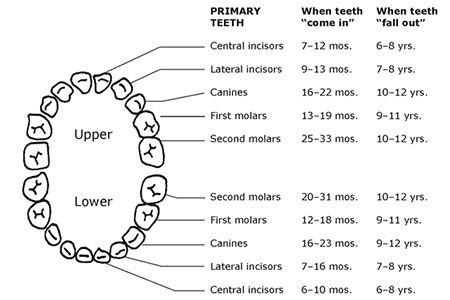Dental FAQs
Are baby teeth really important?
Absolutely! Though baby teeth will eventually fall out, the front baby teeth do not start to fall out, on average, until around age 6. The last of them will not fall out until around the age of 12. Your son or daughter needs those baby teeth in order to eat properly.
Children also need their baby teeth to help maintain the space for the permanent teeth, and to help guide the permanent teeth into the proper place. Kids who are experiencing pain cannot concentrate in school and can have difficulty maintaining proper nutrition.
How can I prevent my child from developing cavities?
- Bring in your son or daughter for a dental checkup and cleaning every six months.
- Brush your child’s teeth 2 times per day for 2 minutes and floss 1 time per day.
- Reduce your child’s intake of sweet and acidic drinks.
- Reduce your little one’s intake of sugary, sticky foods.
- Consider dental sealants.
- Maintain your own oral health. Bacteria from your mouth can be transmitted to you child through saliva (i.e. sharing utensils, straws, cups, etc.).
My child has cavities; what happens now?
A treatment plan has been proposed and reviewed with you by the dentist and staff. We recommend seeking treatment as soon as possible to prevent the cavities from progressing.
What happens if I don’t seek dental treatment?
If you choose not to seek treatment according to the plan the dentist has reviewed with you, please be aware that leaving dental decay untreated can have serious consequences. If dental decay is not treated, your child may experience one or more of the following:
- Worsening of decay, which will require more extensive treatment
- Tooth pain and sensitivity
- Inability to concentrate at school or sleep well
- Inability to chew food and eat properly
- Dental abscess (which if untreated, can lead to external swelling, hospitalization, brain abscess, even death)
What should I look for when choosing the right dentist for me?
Choosing a dentist who “clicks” with you and your family is important, and you may wish to consider several dentists before making your final decision. During your first visit, you should be able to determine whether the dentist is right for you. During your appointment, consider the following:
- Does the office appear to be clean and orderly?
- Do the dentist and staff explain techniques for good oral health?
- Were all of your questions answered thoroughly?
- Is information about cost presented to you before treatment is scheduled?
- Is the dentist a member of the ADA (American Dental Association)?
- Is the dentist a board-certified pediatric dental specialist?
How can I take care of teeth between dental checkups?
- ALWAYS remember to brush teeth at least two times a day, and floss at least once!
- Make sure to use toothpaste that contains fluoride, and ask our dentists if you need a fluoride rinse. This will help prevent cavities.
- Avoid foods with a lot of sugar (which increases the amount of bacteria that grows in the mouth and can cause more plaque and potential cavities), and avoid tobacco (which can stain teeth, cause gum disease, and eventually lead to oral cancer).
- Don’t be afraid to brush your tongue! This will remove food particles and reduce the amount of plaque-causing bacteria. Tongue brushing also helps keep your breath fresh.
- Be sure to schedule routine checkups. It is recommended that everyone visit the dentist every six months.
At what age should I start taking my child to see the dentist?
The American Academy of Pediatric Dentistry recommends that children first see a dentist by thier first birthday or when the first tooth erupts, whichever comes first. This is the perfect age to start establishing a regular home routine and practicing healthy eating and drinking habits to keep your child on the path to a cavity-free childhood, and our helpful staff is here to coach you along the way. We'll also complete a thorough exam to make sure that your child's teeth and mouth are developing normally. After the first visit, be sure to schedule regular checkups every six months.
How often should I see the dentist?
Children, teens, and adults should all see the dentist for a regular checkup at least once every six months. Patients who are at a greater risk for cavities or gum disease, or children in orthodontic appliances, may be required to come in more than just twice a year. Our doctors will help determine how often you should visit our office for regular checkups.
How often should I brush my teeth?
You should brush your teeth at least two times a day. Brushing keeps your teeth, gums, and mouth clean and healthy by removing bacteria-causing plaque.
It is also recommended that you use a soft-bristled toothbrush and toothpaste that contains fluoride when you brush your teeth. You should spend at least a minute on the top teeth and a minute on the bottom, and remember to brush your tongue; it will help keep your breath smelling fresh!
When should I change my toothbrush?
Your toothbrush will eventually wear out, especially if you are brushing your teeth twice a day for two to three minutes each time. We recommend that adults and children change their toothbrush every three months. If you are using an electric toothbrush, be sure to read the directions, because you may not need to change toothbrush heads as frequently.
Patients with gum disease are encouraged to change their toothbrush every four to six weeks to keep bacteria from spreading. After brushing, rinse the brush with hot water to kill germs and keep the bristles clean. If you’ve been sick, be sure to change your toothbrush as soon as possible.
What is gum disease?
Also known as periodontal disease, gum disease is mostly caused by plaque and bacteria buildup that is not treated in its early stage. Other causes of periodontal disease include tobacco use, teeth grinding, some medications, and genetics.
Gingivitis is the beginning stage of gum disease. If detected, it is treatable. Gingivitis left untreated may turn into advanced gum disease. Advanced gum disease (AKA periodontitis) will lead to tooth and bone loss and is a permanent condition.
Brushing your teeth regularly and visiting our office every six months will help prevent gingivitis and more severe cases of periodontal disease. Common signs of gum disease:
- Red, irritated, bleeding, or swollen gums
- Chronic bad breath
- Loose teeth, or loss of teeth
- Extreme tooth sensitivity
- Receding gum line
- Abscessed teeth
If I have braces, do I still need dental checkups every six months?
Yes! In fact, it’s even more important that patients receiving orthodontic treatment visit their dentist regularly. With braces, food may be caught in places your toothbrush can’t reach. This causes bacteria to build up and can lead to cavities, gingivitis, and gum disease. Our team will work closely with the orthodontist to make sure your or your child’s teeth stay clean and healthy when braces are applied.
How do I schedule my next checkup?
Simply call our practice or book online! Our front desk staff will be happy to schedule the next dental checkup at your convenience. If you are a new patient, please let us know and we will provide you with all the information you need for your first dental visit.













